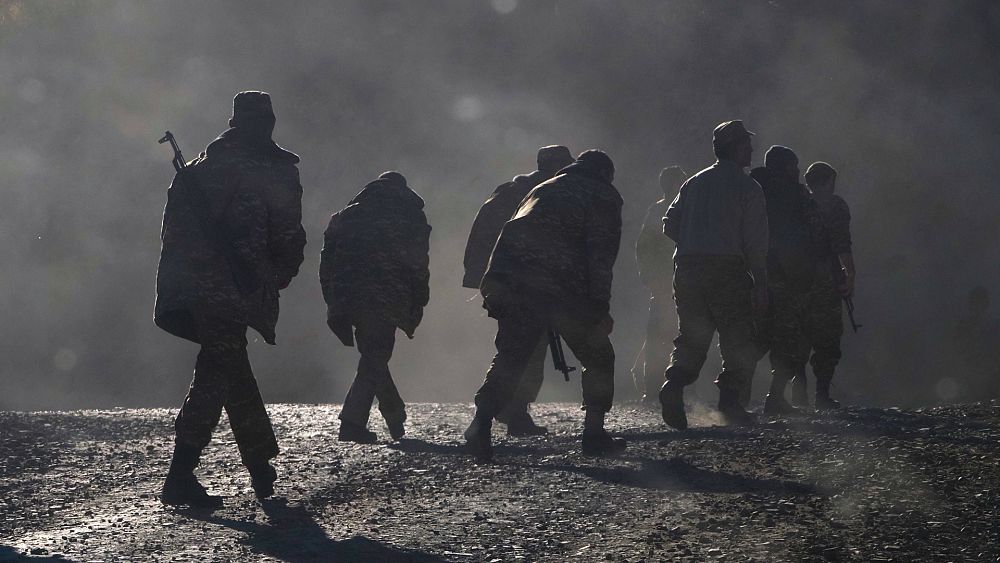Talks between Azerbaijan and Armenia on Nagorno-Karabakh were held in Brussels on Saturday, as Russia proposed to organise a summit in Moscow to regain control of the peace process.
Nagorno-Karabakh, a region with a majority Armenian population but internationally recognised as part of Azerbaijan, is at the heart of a territorial dispute between Baku and Yerevan that has led to two wars.
Azerbaijani President Ilham Aliyev and Armenian Prime Minister Nikol Pashinyan met in Brussels under the auspices of European Council President Charles Michel.
The Armenian Foreign Ministry said the discussions had focused in particular on “the worsening humanitarian crisis in Nagorny Karabakh,” and that both sides had “agreed to intensify work aimed at resolving existing problems.”
“Our exchanges were once again frank, honest and substantive,” said Michel in a short statement at the end of the meeting.
He encouraged both leaders “to take courageous steps to ensure decisive and irreversible progress towards normalisation.”
“As a matter of priority, violence and harsh rhetoric must cease in order to create an environment conducive to peace talks.”
He announced his intention to organise a further meeting with Aliyev and Nikol Pashinyan in Brussels after the summer, as well as a five-way discussion at the beginning of October in Granada in southern Spain, with French President Emmanuel Macron and German Chancellor Olaf Scholz, on the sidelines of the next summit of the European Political Community.
On Wednesday, Washington – which has previously held meetings between Baku and Yerevan in May and June – called for the restoration of free movement on the Lachin Corridor, the only road linking Armenia to Nagorno-Karabakh.
The road was closed on Tuesday by Azerbaijan on the grounds of “smuggling” by the Armenian branch of the Red Cross. Yerevan has been concerned about a worsening humanitarian crisis in Nagorno-Karabakh for several months, due to increasingly difficult access to the region.
Pashinyan denounced what he called the illegal “blockade” of Nagorny Karabakh on Thursday, and several thousand people demonstrated in Stepanakert, the region’s main town, on Friday, calling on Baku to reopen the route.
On Friday, the Red Cross was able to resume medical evacuations from Nagorno-Karabakh to Armenia.
Proposed Summit in Moscow
The involvement of Western countries, notably the EU, in the region has grown since Russia launched its full-scale invasion of Ukraine.
In autumn 2020, Moscow sponsored the ceasefire agreement at the end of a six-week war that saw the defeat of Armenian forces, the death of more than 6,000 people and the displacement of more than 90,000 people into Armenia.
Armenian forces were then forced to cede parts of Nagorno-Karabkah to Azerbaijan.
Russia pledged to deploy soldiers to guarantee freedom of movement between Armenia and Karabakh, but Yerevan has since accused Moscow of failing in this task.
On Saturday, in an effort to regain control of the process, Moscow offered to host a meeting at the foreign minister level, while suggesting that the future peace treaty could be signed in Moscow.
Russia is ready “to organise a trilateral meeting of foreign ministers in Moscow in the near future,” stressed the Russian Foreign Ministry in a statement.
Moscow is also offering to host “a Russia-Azerbaijan-Armenia summit in due course to sign the relevant [peace] treaty.”
But for the moment, tensions have risen a notch.
The Azerbaijani Ministry of Defense claimed on Saturday that Armenian separatists are producing “radioelectric interference directed against the GPS navigation systems of local and foreign airlines” flying in Azerbaijan.
“These incidents pose a serious threat to aviation safety,” the ministry said in a statement.
According to the source, on July 13, an Azerbaijan Airlines plane on a flight to the Nagorno-Karabakh town of Fizuli suffered a GPS system failure due to suspected interference.
The Armenian separatist authorities have rejected these accusations, calling them an “absolute lie”.
Related posts:
Views: 0
 RSS Feed
RSS Feed
















 July 16th, 2023
July 16th, 2023  Awake Goy
Awake Goy 
 Posted in
Posted in  Tags:
Tags: 
















